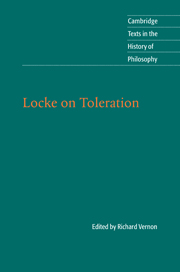Book contents
- Frontmatter
- Contents
- Acknowledgements
- Introduction
- Chronology
- Further reading
- Note on the texts and translation
- Locke on Toleration
- Locke: A Letter concerning Toleration
- Locke: From the Second Treatise (in Two Treatises of Government, 2nd edn, 1698)
- Locke: From An Essay concerning Human Understanding (4th edn, 1700)
- Proast: The Argument of the Letter concerning Toleration, Briefly Considered and Answered (1690)
- Locke: From A Second Letter concerning Toleration (1690)
- Proast: From A Third Letter concerning Toleration in Defence of the Argument of the Letter concerning Toleration, Briefly Considered and Answered (1691)
- Locke: From A Third Letter for Toleration (1692)
- Proast: From A Second Letter to the Author of the Three Letters for Toleration (1704)
- Locke: From A Fourth Letter for Toleration (1704)
- Index
- Titles in the series
Proast: From A Third Letter concerning Toleration in Defence of the Argument of the Letter concerning Toleration, Briefly Considered and Answered (1691)
Published online by Cambridge University Press: 05 June 2012
- Frontmatter
- Contents
- Acknowledgements
- Introduction
- Chronology
- Further reading
- Note on the texts and translation
- Locke on Toleration
- Locke: A Letter concerning Toleration
- Locke: From the Second Treatise (in Two Treatises of Government, 2nd edn, 1698)
- Locke: From An Essay concerning Human Understanding (4th edn, 1700)
- Proast: The Argument of the Letter concerning Toleration, Briefly Considered and Answered (1690)
- Locke: From A Second Letter concerning Toleration (1690)
- Proast: From A Third Letter concerning Toleration in Defence of the Argument of the Letter concerning Toleration, Briefly Considered and Answered (1691)
- Locke: From A Third Letter for Toleration (1692)
- Proast: From A Second Letter to the Author of the Three Letters for Toleration (1704)
- Locke: From A Fourth Letter for Toleration (1704)
- Index
- Titles in the series
Summary
Where I say that ‘force may indirectly and at a distance do some service, etc.’ you say you do not understand what I mean by ‘doing service at a distance towards the bringing men to salvation, or to embrace truth, unless perhaps it be what others, in propriety of speech, call by accident’. But I make little doubt but all other men that read the place, do well enough understand what I mean by those words; even such as do not understand what it is to ‘do service by accident’. And if by doing service by accident, you mean doing it but seldom and beside the intention of the agent, I assure you that is not the thing that I mean when I say force may indirectly and at a distance do some service. For in that use of force which I defend, the effect is both intended by him that uses it, and withal, I doubt not, so often attained as abundantly to manifest the usefulness of it.
‘But be it what it will,’ say you, ‘it is such a service as cannot be ascribed to the direct and proper efficacy of force. And so,’ say you,
force indirectly and at a distance may do some service. I grant it: Make your best of it. What do you conclude from thence? That therefore the magistrate may make use of it? That I deny. That such an indirect and at a distance usefulness will authorize the civil power in the use of it, that will never be proved.
- Type
- Chapter
- Information
- Locke on Toleration , pp. 108 - 122Publisher: Cambridge University PressPrint publication year: 2010



